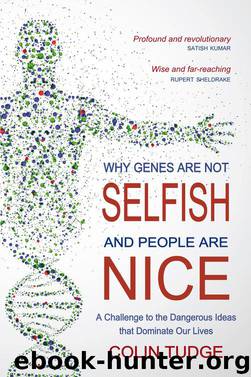Why Genes Are Not Selfish and People Are Nice by Colin Tudge

Author:Colin Tudge [Colin Tudge]
Language: eng
Format: epub
ISBN: 9780863159770
Publisher: Floris Books
Published: 2013-09-13T04:00:00+00:00
‘A persistent state of disequilibrium’
Take methane. There isn’t much of it in the atmosphere but it’s surprising to a chemist nonetheless that there’s as much as there is because, in sunlight, methane reacts rapidly with oxygen to produce carbon dioxide and water. Indeed, to maintain the present levels of methane in the atmosphere the world would somehow have to add at least 500 million tonnes each year. But then again, since it takes two molecules of oxygen to oxidise one molecule of methane it would need to add a commensurate amount of oxygen (which in fact by my calculations means around 1000 million tonnes) to maintain the oxygen. Since the concentration of methane and oxygen remains constant year by year this means that such quantities are being introduced. Could this be achieved by non-biological – ‘abiological’ – means? Emphatically not, says Lovelock. Basic chemistry tells us that this is ‘improbable … by at least 100 orders of magnitude’. This means there is only one chance in 10100 – 10 with 100 noughts – of this being achieved without living systems to help things along; and 10 with 100 noughts is a ludicrously large figure. Only living systems, borrowing energy from their surroundings for their own purposes, could pull such a trick. So the year-on-year constancy of methane and oxygen, one at a low level and one at a high level, means that there must be life. The same is true of the trace gases that are compounds of nitrogen – nitrous oxide and ammonia. They too must be produced in vast quantities even to maintain the present, minute concentrations, for they react and turn into something else almost as soon as they appear. Again, only living systems could produce the necessary amounts.
Intriguingly, too – for the time being, I put it no higher than that – almost all of the gases in the atmosphere in some way help to keep the Earth as a whole in a state that Earthly life finds agreeable. Oxygen, roughly one fifth of the atmosphere, enables Earth’s creatures – or those at least that are adapted to it – to respire very efficiently. That is, when properly controlled, oxygen almost literally ‘burns’ energy-rich organic molecules including sugars to release the maximum amount of energy of which they are capable in the shortest time. Creatures that can use oxygen in this way – the ‘aerobic’ types – are thus by far the most active. They can’t live in airless swamps as the anaerobic types can but they have many other advantages. Oxygen, though, is if anything too lively. Aerobically respiring creatures need to maintain a whole battery of anti-oxidants to mop up any oxygen that leaks around the body, otherwise it is highly destructive. Several of the vitamins, including vitamin C, are primarily anti-oxidants. Excess oxygen in the world at large is just as dangerous. As things are, forest fires and bush fires worldwide are common – indeed they are key components of grassland ecosystems. They are triggered in the wild by lightning.
Download
This site does not store any files on its server. We only index and link to content provided by other sites. Please contact the content providers to delete copyright contents if any and email us, we'll remove relevant links or contents immediately.
Sapiens: A Brief History of Humankind by Yuval Noah Harari(14362)
Sapiens by Yuval Noah Harari(5364)
Pale Blue Dot by Carl Sagan(4996)
Homo Deus: A Brief History of Tomorrow by Yuval Noah Harari(4905)
Livewired by David Eagleman(3763)
Origin Story: A Big History of Everything by David Christian(3681)
Brief Answers to the Big Questions by Stephen Hawking(3428)
Inferior by Angela Saini(3311)
Origin Story by David Christian(3194)
Signature in the Cell: DNA and the Evidence for Intelligent Design by Stephen C. Meyer(3125)
The Gene: An Intimate History by Siddhartha Mukherjee(3091)
The Evolution of Beauty by Richard O. Prum(2992)
Aliens by Jim Al-Khalili(2827)
How The Mind Works by Steven Pinker(2811)
A Short History of Nearly Everything by Bryson Bill(2687)
Sex at Dawn: The Prehistoric Origins of Modern Sexuality by Ryan Christopher(2513)
From Bacteria to Bach and Back by Daniel C. Dennett(2481)
Endless Forms Most Beautiful by Sean B. Carroll(2473)
Who We Are and How We Got Here by David Reich(2431)
